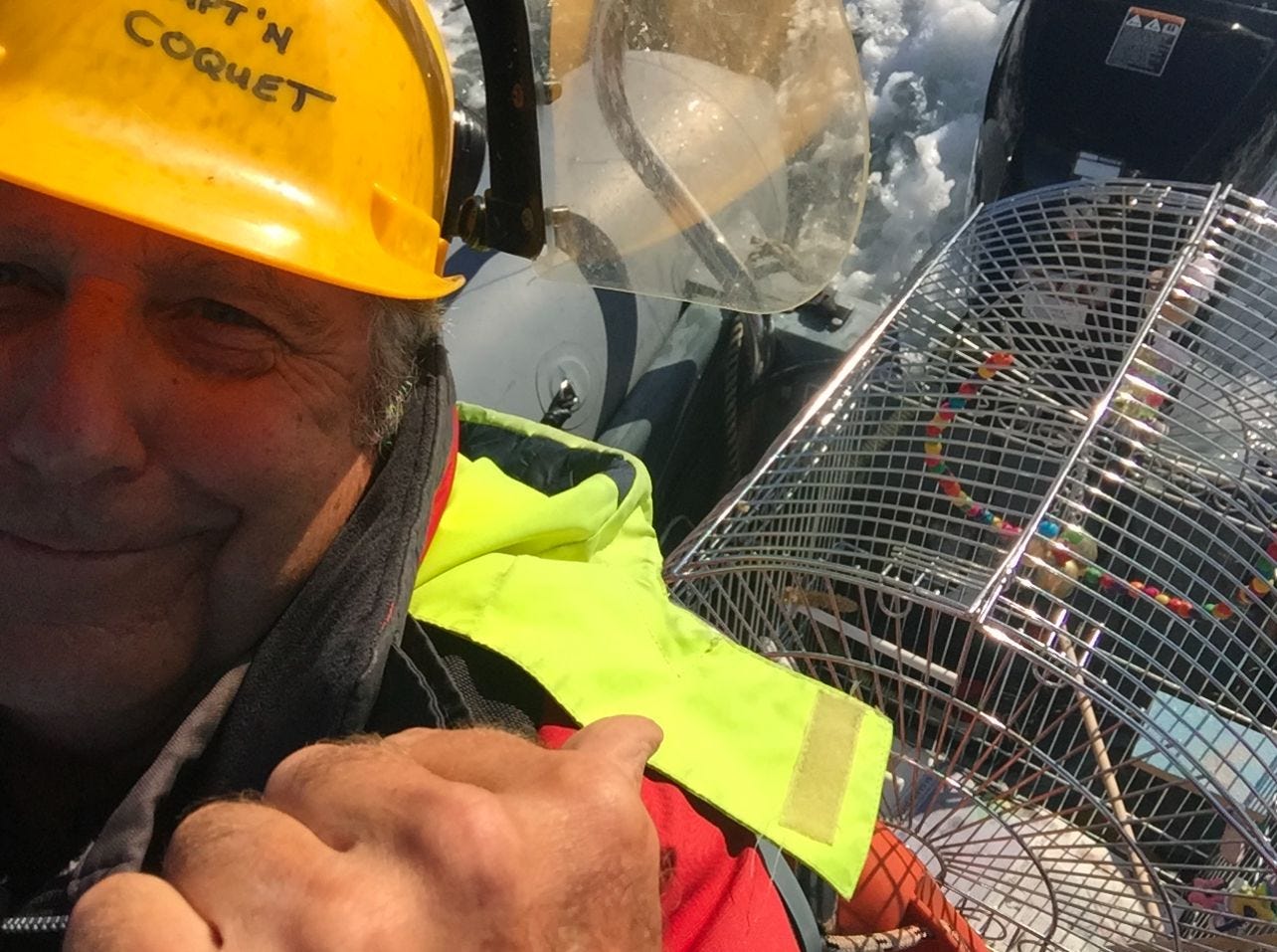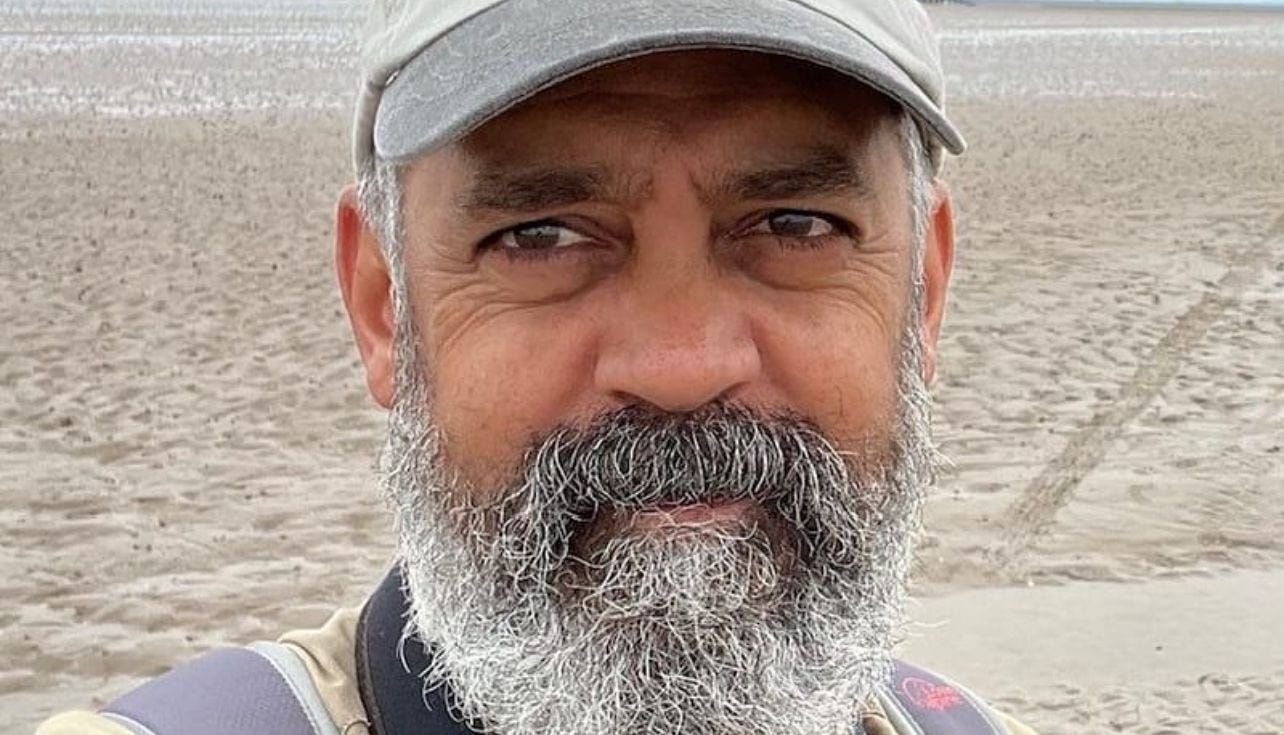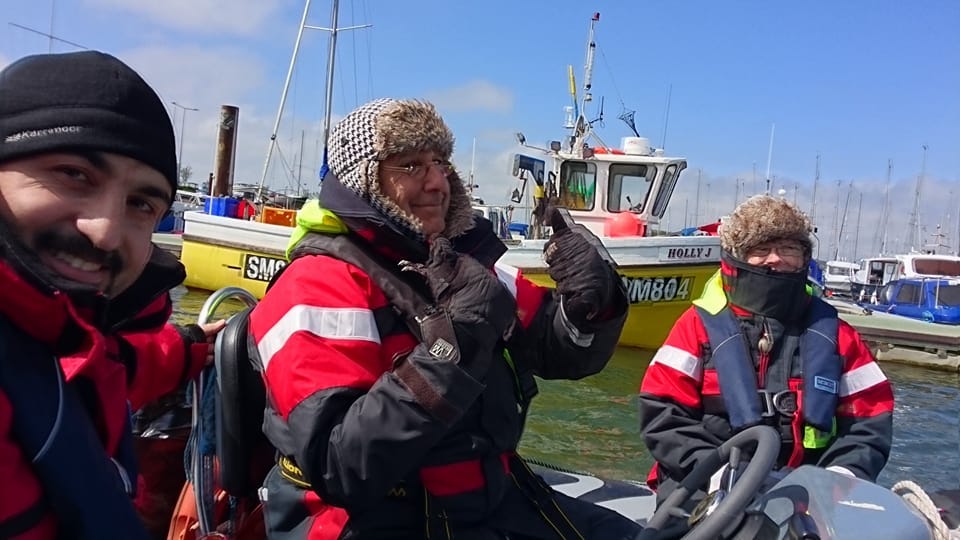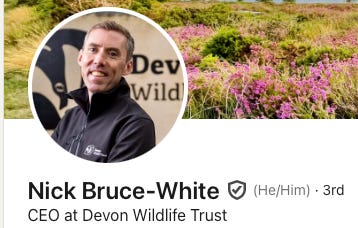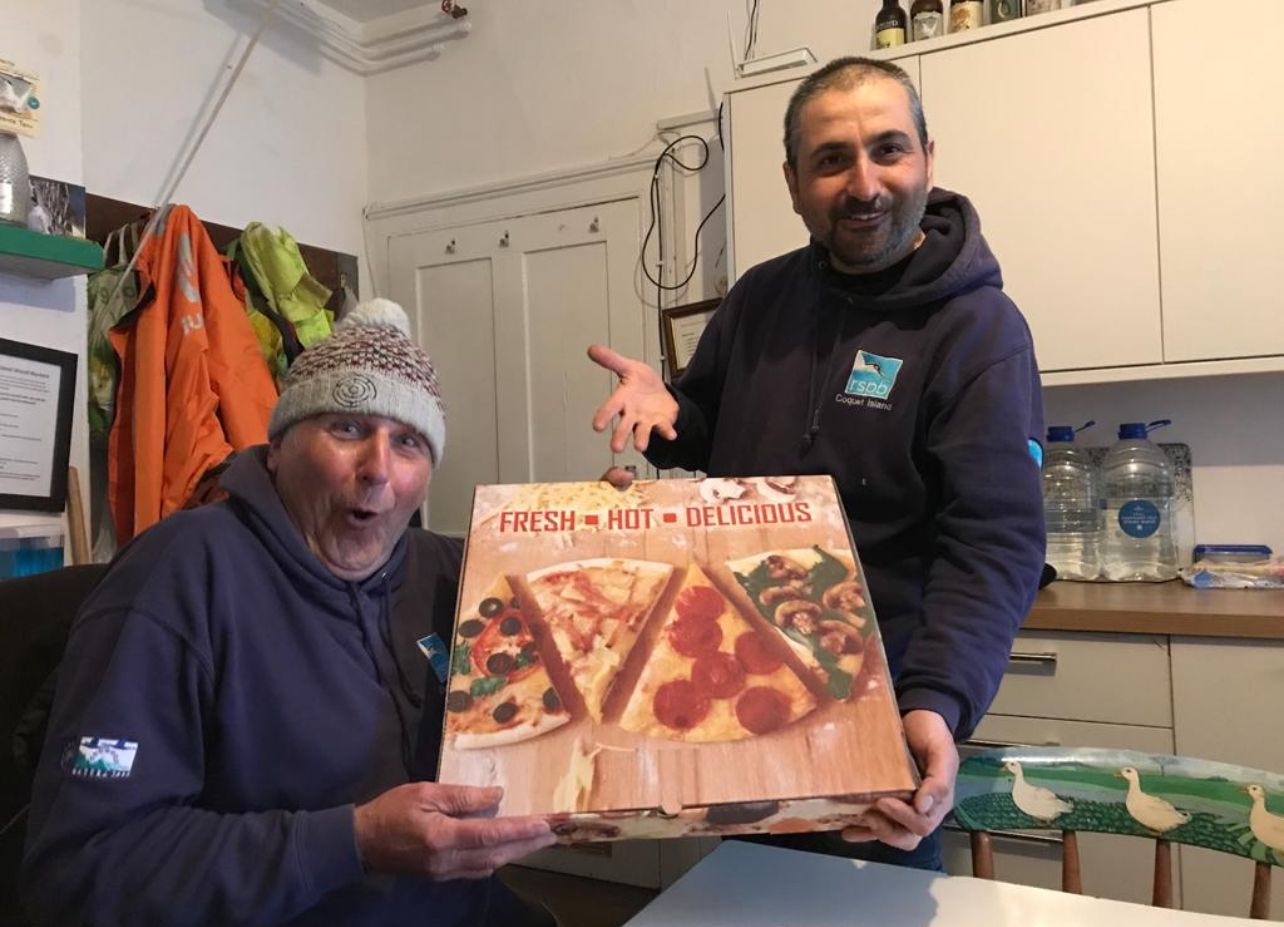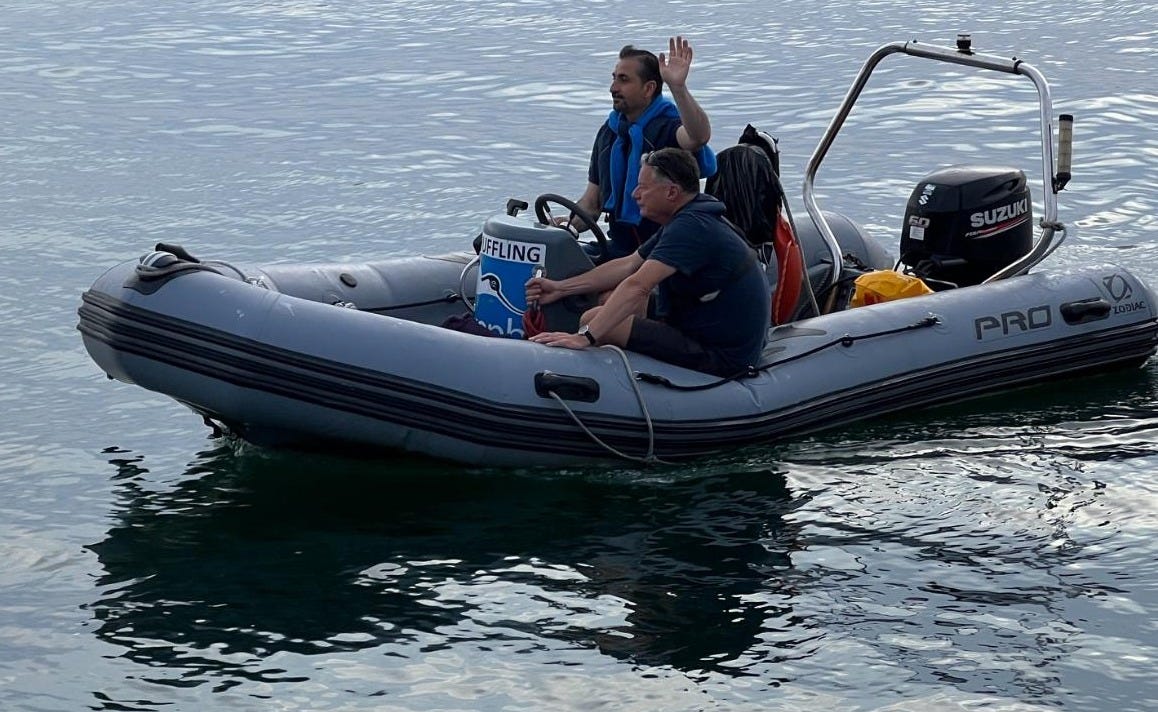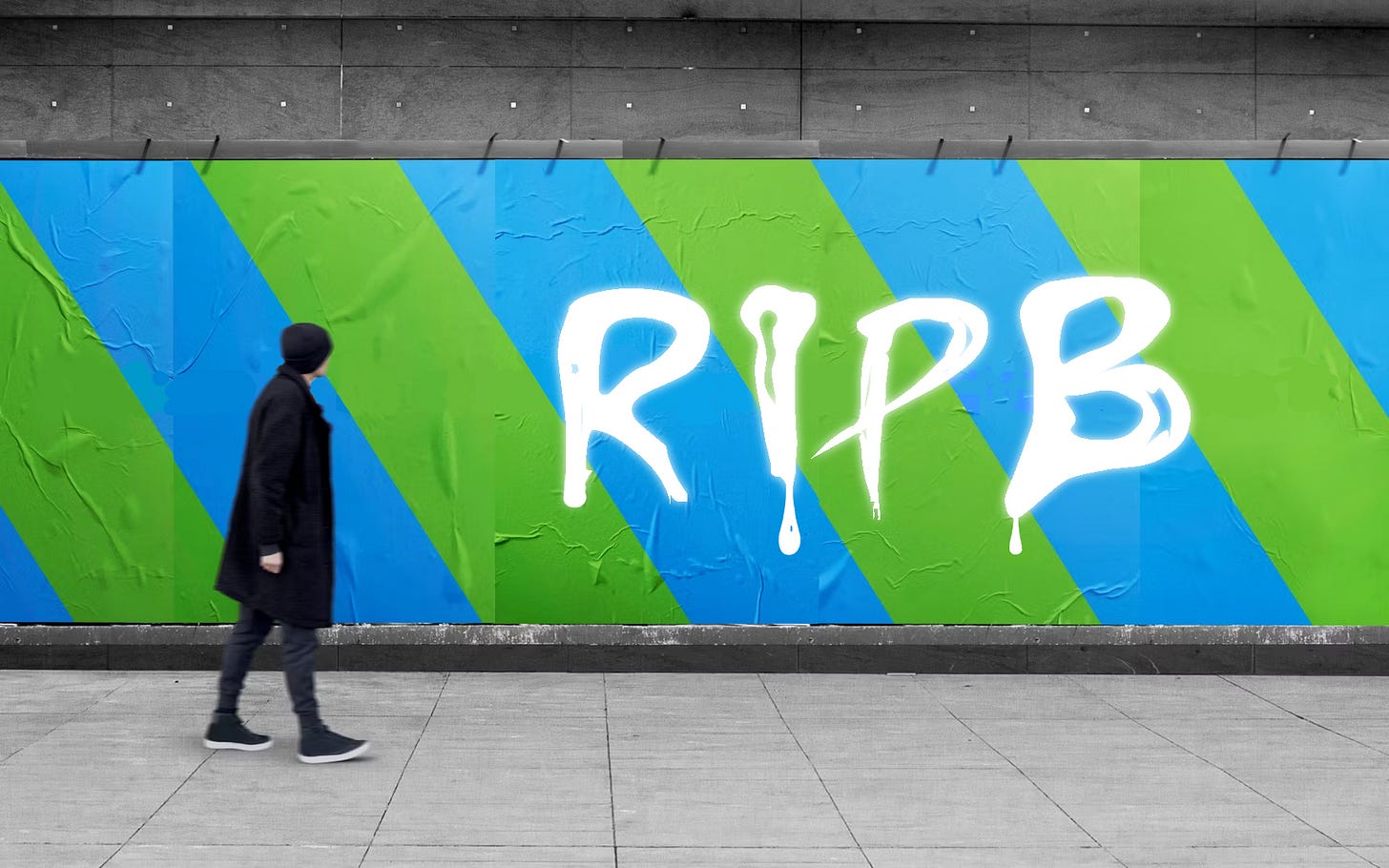Diversity Island: the RSPB's fantasy world where racism, persecution and fraud have replaced wildlife protection
“De plan! De plan!” The plan was to sack one of the charity's longest-serving employees and replace him with a ‘refugee‘ to score DEI points. It failed.
As reported in the British media in November 2024, former manager of the Royal Society for the Protection of Birds reserve on Coquet Island, Dr Paul Morrison, was fired to boost the charity’s image as an employer that valued diversity, inclusion and equity.
Instead, it’s reputation is in tatters after it was forced to compensate Paul for unfair dismissal, wasting thousands of pounds of donor money defending itself against legal action.
This article exposes some of the shady tactics carried out by RSPB’s top staff and Paul’s accuser Ibrahim Alfarwi when they tried to set him up then cover their tracks.
= = =
In August 2015, Martin Harper described Coquet Island as a "glorious place full of glorious seabirds". At the time, he was RSPB’s global conservation director.
"Our warden, Paul Morrison, has led our conservation efforts for a quarter of a century," he wrote on his blog on RSPB’s website. "He and his team have a lot to be proud about: Coquet is now home to a record breaking 100 pairs of Roseate Terns alongside 35,000 other nesting seabirds… It was an absolute privilege to experience first hand the cacophony and smell of the UK's Roseate stronghold."
The reserve was arguably one of the few RSPB manages that showcased genuine successes at the time. Ten years later, it’s a different story. A decline set in that the bird charity tried very hard to blame on the same man Harper recognised as pivotal to Coquet’s conservation triumphs. As one of the RSPB’s longest-serving employees ever, Paul devoted most of his life to caring for the island’s birdlife and the teams of people with diverse skills he recruited. Together they turned the reserve into a true sanctuary for seabirds.
At some point, according to RSPB, Paul suddenly became a slave driver who ignored bird flu health and safety rules, drank on the job, trapped staff on the island with his ruthless rostering and worked ‘illegal hours‘ by volunteering on days off.
These allegations surfaced a few years after the arrival of Ibrahim Alfarwi, a Syrian student who first visited the island in 2015, a few months after Harper.
2016
Alfarwi arrived in the UK on a student visa in 2011, but his first attempt at a PhD failed. Thanks to Newcastle University Professor Chris Redfern and Paul, he was allowed to start a second PhD, which included research work on Coquet.


Back in Syria, he’d left his mother, sister, brother and apparently a child. After civil war broke out, he said he couldn’t go back to his home town of Latakia, a seaside stronghold of support for Syrian President Bashar al-Assad and location of a Russian military base, making it effectively under Moscow’s protection. It was probably one of the safest places to live in Syria throughout the conflict. Alfarwi described the Russians as “saviours“.
None of that was likely to have been taken into account when he was applying to the Home Office for refugee status a few years later.
Since his brother was in the army fighting the UK-backed rebels, it’s likely that Alfarwi would have been pressured into joining the military. The closest he got was mimicking firing rockets at Islamic State (ISIS) fighters from the safety of Coquet.
The media occasionally let slip some of the rebel groups were affiliated with ISIS and gaining a reputation for cannibalising and dismembering Syrian army soldiers.
While this take-no-prisoners policy may have been enough to justify not returning to Syria and signing up, it didn’t stop his brother calling him a ‘coward’, accusing him of fleeing the war in favour of living on an island and looking after birds.
Iron Man
“I've known Paul all my working life,” says blacksmith Stephen Lunn, a Coquet volunteer for at least 12 years. “Paul came [to my workshop] for some jobs one day and he said, ‘Oh, they're for the island,’ and I thought, ‘Island?’ Because everybody around Amble wants an island.
“I said, ‘I'll do the jobs and they'll be free as long as I can do the site fixing.’ So I did this first job, then I went across and I thought, ‘I just can't believe this.’ I did the site fixing and Paul asked us for another job. Then, they have an end of season party and Paul invited us. Ever since then, I've been a volunteer.
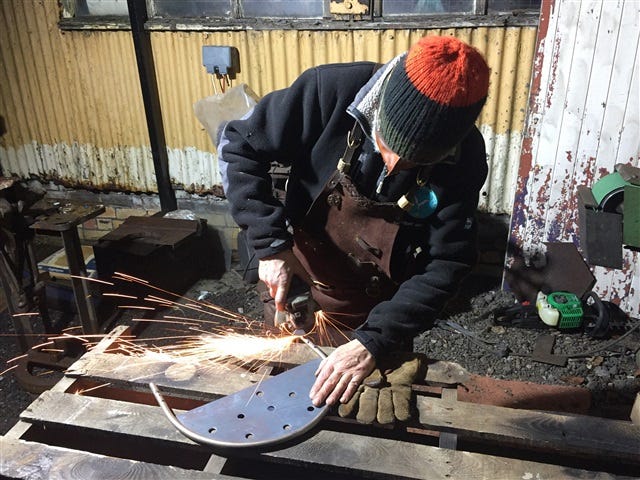
“When egg thieves came, it was just like mad panic. ‘Oh, blimey. We've got to have a 24-hour guard over the birds now.’ So the RSPB commissioned me to make a night hide… you could have seven, eight [people] all seated around. It had drop down tables, drop down chairs, porthole windows, a little wood-fired coffee maker. Plus, it was fully rotating.
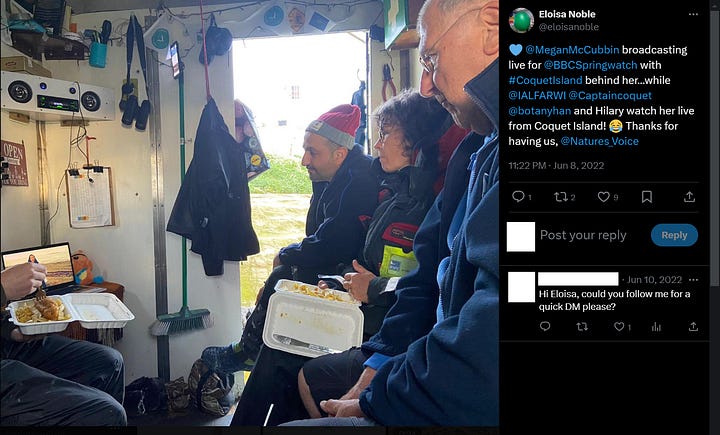
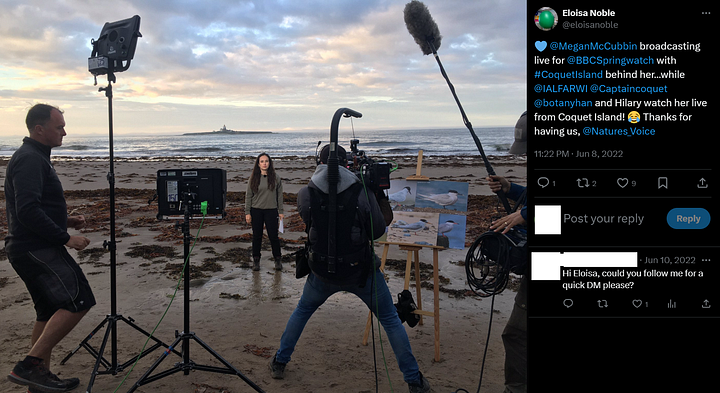
“I was the handyman. Everything rusts, so I’m replacing everything with stainless steel… plus the general maintenance, grass cutting and clearing away and lifting things about… I really enjoyed it because it's such a special place.
“When you go on the island, you're there to do a job. So for the 12 years I’m going out there, we put our PPE on, which is our flotation suits and life jackets, and [Paul] always gives you a little health and safety talk, double checks you got your life jacket on properly. So he's just caring for all his volunteers and staff all the time.”
Green zone
In 2017, CNN ran this story: ‘Tired by war, Syrians seek respite by the sea‘. “Children splashing in the Mediterranean, young men and women in swimwear smoking hookah,” it begins. “This could be any holiday hot spot, but it’s Latakia, a seaside town in war-torn Syria.“
The article says the town “escaped the fighting largely unscathed” and has been “a bastion of relative peace during war”. It’s a tourist destination for Lebanese.
The only trouble at the town appeared to be uprisings at the refugee camp the United Nations (UNRWA) says is home to 10,000-or-so Palestinians who “sought better opportunities and safety abroad”.
Around the same time, Alfarwi spent his birthday in the safety of the Morrisons’ house. Isabel, a piano teacher, played some tunes for him, which Paul videoed and Alfarwi posted on Facebook.
“He started in 2016, so I've known him since then,” says volunteer Hilary Brooker-Carey. “He said he was from Syria and he'd never be able to go back because of the war. So we kind of adopted him and tried to make him feel at home. His was the only birthday we ever celebrated on the island. Paul used to have him at his house at Christmas time, so he'd have a family.”
In 2017 and 2018, Alfarwi and his female ‘flatmate’ were invited to the Morrisons for Christmas lunch.

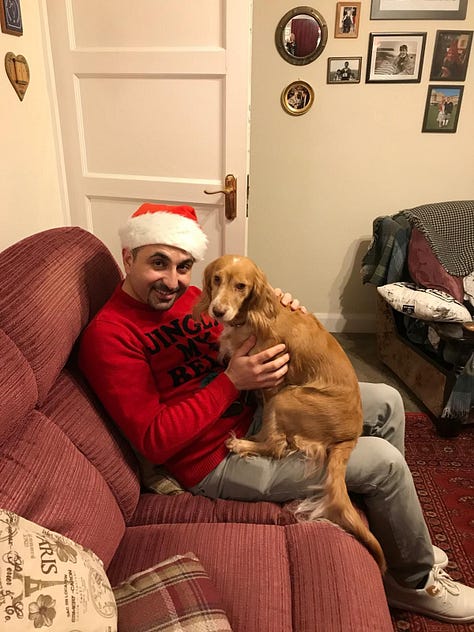
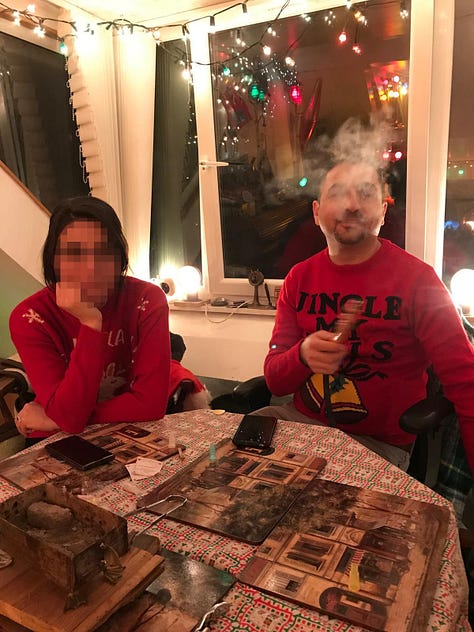
His flatmate turned out to be more than just a flatmate. Alfarwi gave the team the impression he felt inferior to her and was determined to prove himself. She was involved in medical research for her university studies, while he was a mere assistant warden looking after birds.
A post on Facebook seems to confirm there was rivalry, with Alfarwi paraphrasing his flatmate, who he sarcastically refers to as ‘doctor‘, to suit her lofty goals:
“I have always said the value of research is estimated by its connection to medicine or finance and any research that does not carry these characteristics is neglected and not funded. Understanding and maintaining food chains and programmes that protect and preserve [bird] habitats is research for entertainment and prestige only!!”
Alfarwi’s work has no value, is for the amusement of others and its merits based entirely on opinion, his flatmate says, compared with the life-saving work she would be doing for her PhD, such as researching cures for diseases.
There was an occasion where an attempt by Alfarwi to demonstrate his bird handling skills raised questions about his reliability and trustworthiness and may have partly caused the rift.
His flatmate asked him to look after her beloved budgie while she was away at university. He took the bird to Coquet Island and left it in a room with an open window. It escaped and was pecked to death by terns vigorously protecting their nests.
Instead of telling his flatmate, he bought a replacement and made everyone on the island promise not to tell her. It’s unclear whether she ever realised. As far as the terns were concerned, it was self defence.
Christmas 2019, Alfarwi declined the lunch invitation, but visited the Morrisons anyway because he wanted to go to Coquet to celebrate with cigarellas and whisky. He was alone.

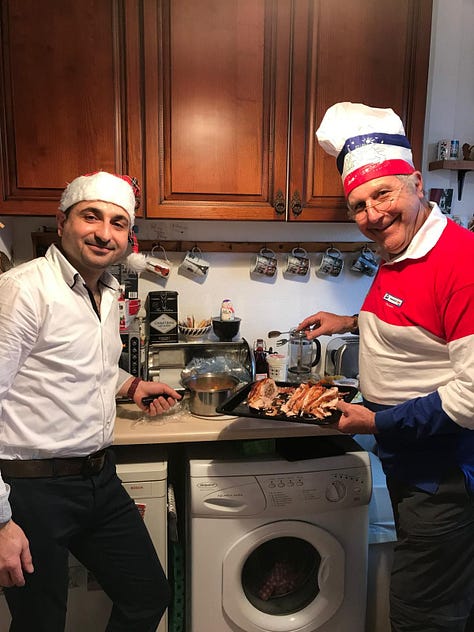
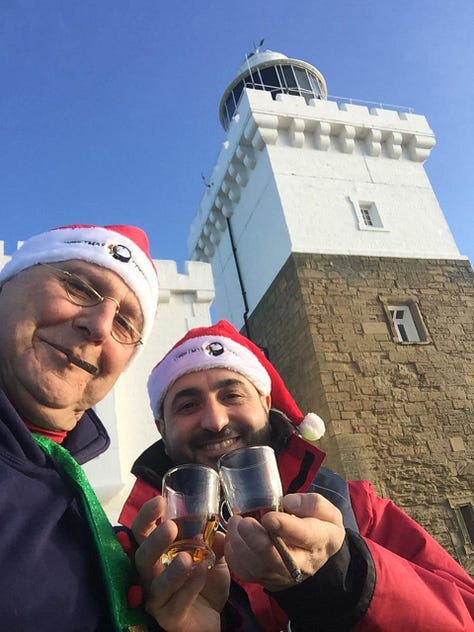
The French connection
In 2005, the Morrisons walked into a bar in Paris, where fellow Brit Peter Brook was resident pianist. After a few visits, the three were friends. Isabel often took over for a few tunes, giving Peter a break.
Peter: “I'd sit down and chat with Paul and stuff, telling me what he did. This is about 15 years ago. He eventually said, why don't you come up to Coquet and help out? I was like, yeah, that'd be great.
“When he was working on Coquet for the RSPB, he was getting people that would not normally be there to come and bring their experience. If he thought they were people that would be good team members and up for working hard, but having a good time as well, in the team spirit of Coquet, he would get them involved.
“It was a good experience because I've come from Paris, a busy city, to Coquet Island with a load of birds and drive on a boat and stuff. It was a nice adventure for a week. I did it a couple of times and then there was the incident, which led to [Paul] being fired.
“[Alfarwi] was, a lot of the time I was there, on his computer or WhatsApp and chatting to his birds - women, not the feathered kind. A couple of times he said, ‘Say hello to this person. Peter's English and he's doing this and that.’ and introduced me to some women. I was quite happy to chat to him, but with hindsight, obviously it wasn't that professional. He should have been doing his job.”
2020 division
The RSPB ordered work on its reserves closed in 2020 due to the coronavirus lockdown, but Paul argued that isolation on the island was safer than the mainland.
Although it meant Alfarwi was months apart from his flatmate, it gave him time to focus on improving his image and proving to her he wasn’t just a babysitter for birds, but a scientist and his research was important.
He took a step towards this in 2021 by graduating from Newcastle University. Paul and Chris Redfern were at the ceremony on 30th March.
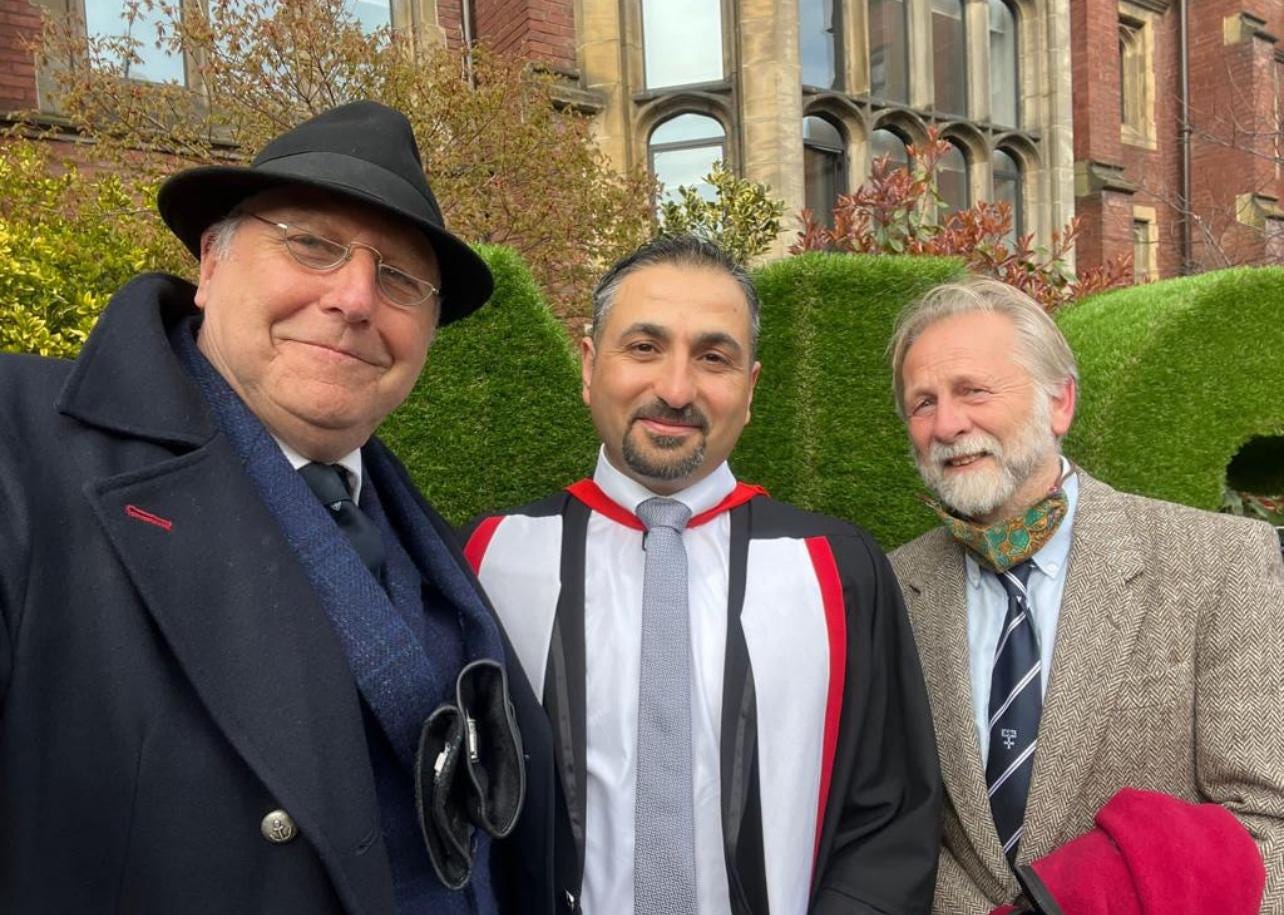
This became a problem for RSPB in November 2022 when Coquet’s site diary was seized by police. Entries made by Alfarwi said he was trapped and solo on the island due to Paul’s oppressive timetabling from 28th March to 11th April.
With university degree congregations scrapped due to a covid lockdown, the team decided to host one for Alfarwi on the island on 11th April.
“It was Sunday tea time,” says Stephen. “We all went on the island and did another graduation with him. [The university ceremony] was bang on the time he said he was on the island and nobody gave him any help or whatever. But, you know, we baked him a cake and donned gowns and caps for [the island bash].”
“He said he'd never been allowed off the island,” says Hilary. “This is untrue. He was off regularly. I used to go on for the weekend so he could go off the island to do his library job in Newcastle… You wonder [about] the things that he has told us; how much of it actually is reality and how much is just untrue.”
In Alfarwi’s mind, graduating made him more qualified to run the reserve than Paul.
“That was what was behind his allegations,” explains Peter. “He saw himself as being this professional scientist and Paul hasn't got a PhD [in bird research]. He [characterised Paul] as a maverick who didn't deserve to have his job.”
About that time, Alfarwi’s immigration status became an issue, threatening his vision. An internal RSPB memo told senior staff that support for visas for foreigners was ending. His work permit was expiring in 2022, so he would be kicked out.
Paul objected, standing up for Alfarwi by arguing the RSPB would be the only organisation of its kind with such a policy. The strongly-worded email to HR triggered disciplinary action against Paul led by regional manager Jim Wardill. It seems this was the first attempt to ditch the reserve manager for the up-and-coming ‘golden boy‘.
This was foiled when the investigating officer threw out the complaint, as was a second complaint that Paul broke covid ‘social distancing‘ rules by organising the Coquet graduation party. A third futile attempt by Wardill to depose Paul came with the claim he was drinking alcohol at the celebration. There was a champagne toast but it was pointed out nobody was working at the time - 5pm on a Sunday.
To solve the visa issue, Alfarwi declared himself a refugee. When the Telegraph published that fact in November 2024, the RSPB told the newspaper its article was incorrect because Alfarwi wasn’t a refugee. The RSPB hadn’t bothered checking his residency permit, which he took a photo of and sent to his friends.
Local hero
In December 2021, the vital work of volunteer for more than 30 years Hilary Brooker-Carey was celebrated in an RSPB press release. It spoke of her receiving the President’s Award (the charity’s “highest volunteer accolade”) in 2001, then in 2012, carrying the torch for the London Olympics. Before 2022 was over, she’d quit.
Hilary: “I was starting my 32nd year. I did just about anything they needed help with. So it could be monitoring, vegetation control, night duties. I was the second solo skipper for the boat, if somebody had to come off, I would go and be the second person there. Because I'm local, it's easy for me to just get on the boat.
“We called it the ‘Coquet family’ because it's been going on for years and it's always been a very tight community. So the team was always there to help each other, support each other. We worked hard but Paul made sure we had rest time as well.
“[Alfarwi] came on the island originally as a student to do his PhD and we supported him and everything was fine. He was a member of the family.”
The interview
In April 2022, RSPB’s northern England operations manager David Morris interviewed Alfarwi for a promotion. With his PhD and BRP in the bag, this would bolster his campaign to show his (possibly ex) flatmate and family in Syria he was doing something worthwhile and important.
Morris spent the previous night on the island drinking with Alfarwi, who had a reputation for taking the boat to Amble some afternoons to go to the pub.
For the interview, Alfarwi wore a kilt as a joke after a female friend complained she could not get any jobs because interviewers were easily distracted by her skirts. Morris exclaimed that he could see Alfarwi’s knees, tried grabbing them, then suggested opening a bottle of wine. It’s ironic that later he was one of the RSPB staff interrogating Paul after Alfarwi claimed he was drinking on the job.
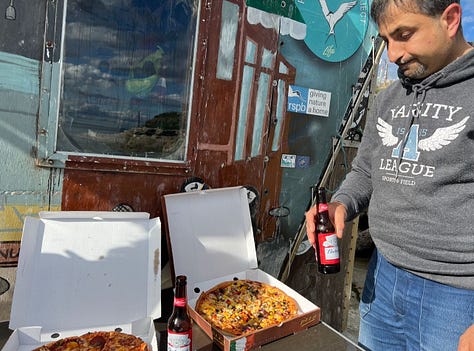
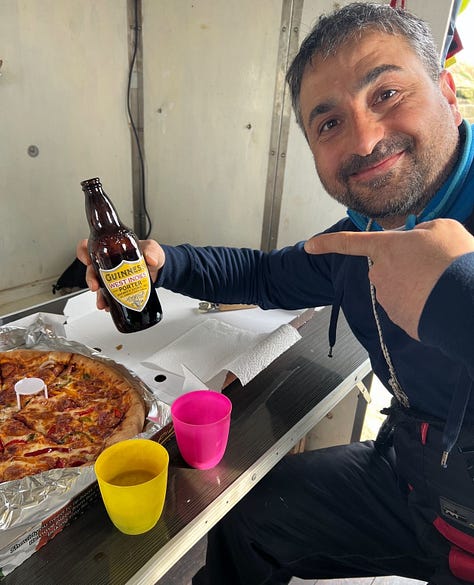
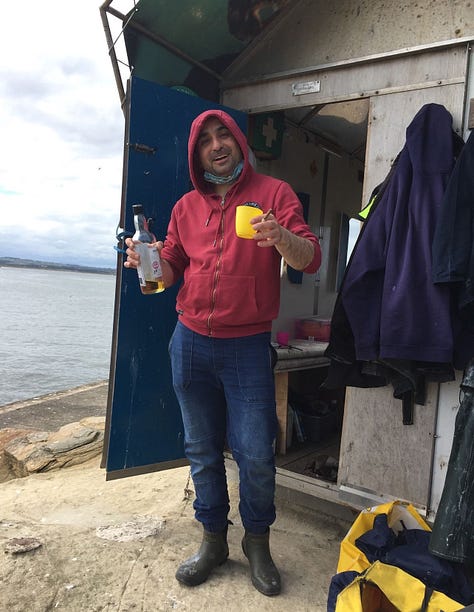
“Paul would never dream of drinking and working,” says Stephen. “On special occasions, Paul would out of his own pocket, supply a little picnic and there'll be, like seven bottles of beer between seven of us.”
The interview, which was recorded, was for the permanent post of warden on the island, a step up from Alfarwi’s assistant warden role at the time. Morris used the same interview questions Alfarwi was asked at the assistant warden interview and the ‘job offered’ box on the HR form was ticked before anyone sat down or said anything.
Paul realised it wasn’t right and formally complained about the flawed process. When asked, Morris said the wine he referred to was the bottle he shared with Alfarwi the night before.
IA on AI
In July 2022, RSPB CEO Beccy Speight visited Coquet. She recorded a PR video in which she warned bird flu is spreading across the UK and the island could be next. This was a reason people should donate money to the charity, she insisted.

Just days after Beccy’s visit, bird flu arrived. In an interview with ITV News, Alfarwi described how even scientists like him weren’t immune to the trauma of watching birds die.
“Very emotional, you can't isolate yourself from this at all," he said. "I am a scientific person, an academic researcher, but at the end we are human. So if you see something happening to them, it’s something for us as well.”
The incident
Three weeks later, Alfarwi was seen slaughtering seabirds he visually diagnosed as having bird flu. Peter witnessed the killings and filmed him chasing one of the birds - a great skua - then stepping on it.
His foot was on the bird for a few minutes, while he motioned for Peter to come over and video the death blow, apparently relishing the task, which was not sanctioned by Paul or anyone else at the RSPB.
“I was on there volunteering and taking a load of photos, as you do because it's quite nice,” says Peter. “[Alfarwi] ringed its neck and then smacked its head on the rocks… to make sure it's dead. He said stand out of the way because there'd be some blood, and there was. I didn't want to take any [photos] after that because it was a bit morbid.
“One of the first accusations [against Paul] was he broke PPE rules in the middle of a bird flu pandemic in 2022. [Paul], a pillar of the RSPB for 38 years and did everything by the book, has been [criticised] by somebody I witnessed just walking around, not giving a shit really, and handling sick birds [with no PPE] and getting us to come over and see them... I was like, come on… this is not right.”
“That year, [Alfarwi] was getting to be very confrontational with Paul,” says Hilary. “I did say to him earlier in the season, ‘Have you noticed this? I think he's after your job.’ It's like he's trying to displace Paul or put him in a bad light the whole time. It was wearing for me watching, to see that everything Paul said he had to challenge.”
Two weeks later, Alfarwi was speaking at the International Seabird Group Conference, telling people how the team on Coquet Island was dealing with the threat of bird flu.
“We had different procedures to prevent spreading the virus,” he told the webinar. “We disinfected every tools we are using, ringing the birds, using gloves, change the gloves between each bird, disinfect our shoes from area to area, just in case we have the avian flu there.”
None of those procedures was followed in the skua incident.
Skewered
Armed with an arsenal of ludicrous accusations, Alfarwi launched his attack on Paul in September 2022. Claims included Paul treating him like a ‘slave’ and making him do all the hard work, trapping him on the island with no days off, drinking on the job and failing to stick to strict PPE rules during the bird flu outbreak.
Bizarrely, the RSPB decided not to stand by a man with a spotless record dating back decades who had proven to be a valuable asset and a protector of birds. Instead, it backed Alfarwi, who was relatively unknown.
The charity began disciplinary measures that dragged on for weeks, with a suspension then investigations, interrogations and finally an unlawful sacking.
“There was something going on in the background because they were trying to bring in rosters,” says Hilary. “[David Morris told me] Paul and Ibrahim were having a difference of opinion... So I was interviewed based on that.”
Hilary had overheard Alfarwi telling Paul he is “too old“ for the job. However, that evidence was dismissed due to Alfarwi failing to carry out his a basic and vital job function - filling in the site log, or diary as the workers called it.
“My name wasn't written in the diary for that day, therefore, I wasn't there,” she says. “The diary [is] a record of everything that happens on the island. Health and safety, rare birds, injured birds... who's visited, what happened, what they did... It's the duty of the warden on the island to do that at the end of the day. But the diary hadn't been filled in. That year [it had] hardly been filled in at all.”
This exposed the inconsistent and biased approach of RSPB, with Wardill claiming the diary was crucial evidence and Morris desperately trying to play down its importance. The aim of both men was the same - protect Alfarwi.
In late 2022 though, RSPB’s management must have realised they were fighting a losing battle.
Nick Bruce-White, who was juggling operations director for southern England and acting England director titles at that time, approached Paul with a derisory sum he described over the phone as a “generous offer”. If he accepted it, Paul could still leave the charity with his “head held high“, he insisted.
Since Alfarwi had been going round Amble telling people Paul was sacked and that he’s in charge, it had gone beyond the stage where Paul’s name could be saved from a public rubbishing by his usurper. Not long after, Bruce-White scurried off the sinking ship and sought refuge about as far away from Coquet as you can get (in the UK).
“Paul was gagged,” says Stephen. “He couldn't say what was happening… People were making up their own minds why he was suspended, which is usually way off the mark. Because they [assumed I was] suspended as well, nobody talked to us. So from going around Amble and talking to people, everybody avoided [Paul and I] like the plague. He was so unhappy and he couldn't talk about it.”
“They've been having interviews after interviews after interviews,” Hilary recalls. “It was almost like they’re trying to wear him down. But Paul's resilient. If he thinks this is an injustice, he'll fight it till the end.
“I'd warned Ibrahim about that, because there was one point [I heard him say] to Paul, ‘If you just accept it, admit to it, you'll get a smack on the wrist and everything will go back to normal.’ I said to Ibrahim, ‘If you were accused of something, would you say, OK, I'll take the punishment, but I didn't do it?’ I couldn't understand his logic.”
At the time, she had no idea Alfarwi had levelled a series of false claims against Paul, who was eventually fired for violating health and safety rules. The claim was disputed by the long-term volunteers, who quit in protest.
Senior RSPB staff knew Alfarwi was a loose cannon who threatened the reputation of the reserve and the charity, but continued pushing their poorly-constructed claims and cover up stories.
R.I.P.B.
James Robinson, RSPB’s chief operations officer, insisted all allegations against Alfarwi were investigated. But neither Peter, who filmed him killing a bird, nor long-term volunteer Stephen were asked for statements.
Paul’s whistleblower complaint describes how Alfarwi lied about being trapped on the island. At one point in the investigation, Morris left Alfarwi unsupervised in a room with the unmaintained Coquet site diary, allowing him time to fill in the necessary gaps that would appear to back up his case. It didn’t work, but did add tampering with evidence to the list of Alfarwi’s dubious achievements and Morris’s record is now the focus of a separate abuse of power complaint.
Paul put Beccy Speight’s name forward as a witness to him following PPE procedures after he was accused of not sticking to bird flu risk rules. But when quizzed, the RSPB CEO claimed she couldn’t remember whether Paul gave her protective clothing. Yet in a social media post sent from the island, she wrote: “I take my protective hat off to you all,” acknowledging she was wearing PPE at the time.

Outraged by Paul’s treatment, a number of people wrote to the charity’s trustees to complain about the unethical behaviour of senior staff, but Beccy Speight’s office intercepted a couple of the letters.
One of the writers received a phone call from Robinson. He told them there was no evidence of wrongdoing by RSPB managers, which was a lie or showed he was so far out of the loop that he didn’t have access to complaints or the truth.
The false allegations and process failings by RSPB management led to an Advisory, Conciliation and Arbitration Service (ACAS) employment tribunal, which cost the RSPB dearly, in financial and reputational terms.
It didn’t help when Peter released the video of the skua incident or the negative media coverage after the tribunal, which labelled Paul a victim of unjust diversity policies. In the hundreds of comments on newspaper articles, many were from angry RSPB members who vowed to cancel subscriptions and end donations.
“On [RSPB’s] website, it's clearly written,” says Peter. “We are looking to reduce the number of white English people and increase the number of ethnic minority people... That's what they're doing… [Paul] was just a number to get rid of. Then we can have Alfarwi, who's obviously a Syrian [refugee]. He fits into the slot nicely.
“Then the bullying and cover up of [the skua] incident to protect the RSPB's reputation and ensure [donors] keep donating so Beccy Speight can keep her nice high salary… [£200K] per year. I think it's more than the prime minister.”

Despite RSPB admitting Paul was unfairly dismissed and dishing out ‘substantial‘ compensation, Robinson continued defending the charity’s flawed policies and illegal scheming and labelling criticism of the Syrian “vile racist commentary”.
“This is what really annoys me at the moment,” says Hilary of Robinson’s rejection of the problems Alfarwi and RSPB have caused. “I think the RSPB are trying to change it into a racist matter and it's certainly not. It couldn't be further from the truth.”
In his rant on the RSPB website*, the COO confirmed that RSPB is still employing Alfarwi but in what capacity and where are unknown.
Alfarwi is also a victim of the belief system that wants to create a fantasy world of fairness through discrimation, where expertise and quality are relegated in favour of race/colour/sexuality quotas.
With the charity ecouraging Alfarwi and prepared to break rules and the law to promote him, any talent and skills he has have become irrelevant. Like Paul, he is just a number, used by the well-paid RSPB managers cheering on diversity, equity and inclusion policies they know will never label them expendable.
Had Alfarwi gone with the flow instead of gaming the system, he would have almost certainly ended up running the Coquet Island reserve anyway - no DEI policy required.
Now he’s in hiding, with every move controlled by his RSPB masters.
Epilogue: future schlock
Coquet Island’s new manager, Stephen Westerberg, came from a 13-year spell at Geltsdale reserve in Cumbria, where the moorland bird population has declined since the RSPB took over in the late 1990s. In 2006, it was taken off Natural England’s list of known breeding sites for hen harriers. Two years later, it had the lowest populations of moorland species in the North Pennines.
The RSPB routinely blamed other people for its failures and under Westerberg’s management, the policy continued. Grousemoors near Geltsdale were accused of killing hen harriers without RSPB providing a scrap of evidence to back up the claim.

Westerberg has established himself as a reliably-greasy cog in the RSPB’s spin machine, so anything he says about Coquet should be taken with a dose of salts and flushed into oblivion.
“[Alfarwi and the RSPB have made] the wildlife and the birds suffer,” says former Coquet volunteer Stephen Lunn. “The site wasn't prepared for the next season when the birds came back... No disrespect to the other ones who are going on the island, but it takes a long time to get used to what the birds need. So if you don't have the nesting site prepared for them, they just won't lay eggs.
“That's the biggest tragedy, in my eyes.“
*The original blog posted by James Robinson has been rewritten in the third person. As well as a spelling mistake or two, it adds a line saying the blog was published in response to “unfounded reports in the media“. Comments criticising RSPB have been removed.
Related items:
The People's Plan for Nature: a crackpot scheme by top UK charities that will kill the UK
Lethal protection: why does the RSPB end up killing everything it tries to save?
RSPB boss Beccy Speight apologises for warden stomping on seabird's head
Time and turd: is the RSPB releasing sewage into one of its marine reserves?
Nest cam cover up: RSPB staff stress out rare birds at troubled Northumbria reserve
Was BBC called in to fix Coquet Island scandal after RSPB's disastrous damage control?










